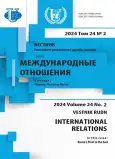Algeria - Russia Relations: Strategic Partnership in the Age of Geopolitics
- Authors: Sour L.1
-
Affiliations:
- University of Mustapha Stambouli Mascara
- Issue: Vol 24, No 2 (2024): Russia’s Pivot to the East
- Pages: 204-215
- Section: THEMATIC DOSSIER
- URL: https://journal-vniispk.ru/2313-0660/article/view/320703
- DOI: https://doi.org/10.22363/2313-0660-2024-24-2-204-215
- EDN: https://elibrary.ru/VQBUIP
- ID: 320703
Cite item
Abstract
The relationship between Algeria and Russia is stronger than at any other time in history. While this may be true in most regards, the historical narratives help to decipher how the Algerian-Russian relationship has evolved to its current state. The problems of modern relations between Algeria and Russia are revealed. The relevance of the topic is linked to the fact that relations between the two countries have undergone a qualitative change in recent years, as military ties have expanded to include economic relations and investment cooperation, leading to a new dynamic in bilateral relations. With growing interdependence, the two countries are also paying attention to the policies of major powers, especially Western powers, and the traditional bilateral strategic cooperation is deepening to address new geostrategic challenges, which will largely determine their future direction. Under these circumstances, it is important to analyze the emerging geopolitical dynamics and determine its impact on the strategic aspects of the bilateral relations. This article aims to highlight the main developments in these relations and to emphasize their evolution in the era of geopolitical tensions. Methodologically, the study is based on political realism. The main sources of the analysis are materials of think tanks, speeches of official officials and others. The study shows what underlies the current cooperation between Algeria and Russia and how geopolitical dynamics affect it. Both countries see each other as important security partners in certain regions, such as North Africa and the Sahel, and as partners in more ambitious projects of a political and strategic nature.
About the authors
Lotfi Sour
University of Mustapha Stambouli Mascara
Author for correspondence.
Email: sour@univ-mascara.dz
ORCID iD: 0000-0001-8783-9340
PhD (Political Science), Associate Professor, Department of Political Science
Algiers, AlgeriaReferences
- Byrne, J. J. (2009). Our own special brand of socialism: Algeria and the contest of modernities in the 1960s. Diplomatic History, 33(3), 427-447. https://doi.org/10.1111/j.1467-7709.2009.00779.x
- Davison, R. H. (1976). “Russian skill and Turkish imbecility”: The Treaty of Kuchuk Kainardji reconsidered. Slavic Review, 35(3), 463-483. https://doi.org/10.2307/2495120
- Dawisha, K. (1981). Soviet decision-making in the Middle East: The 1973 October War and the 1980 Gulf War. International Affairs, 57(1), 43-59. https://doi.org/10.2307/2619358
- Grimaud, N. (1984). La politique extérieure de l’Algérie, 1962-1978. Paris: Karthala.
- Hamchi, M., & Rebiai, S. (2014). Russian-Algerian relations in a multipolarizing world. In T. Deych, A. Zhukov, O. Kulkova & E. Korendyasov (Eds.), Africa’s growing role in world politics (pp. 257-273). Moscow: Institute for African Studies RAS publ.
- Iratni, B. (1986). Foreign policy and nation-state building in Algeria, 1962-1985. [dissertation]. Coventry: Warwick University.
- John, P. S. (1968). Independent Algeria from Ben Bella to Boumédiène: II. Foreign Policy. The World Today, 24(8), 339-345.
- Katz, M. N. (2007). Russia and Algeria: Partners or competitors? Middle East Policy, 14(4), 152-157. https://doi.org/10.1111/j.1475-4967.2007.00330.x
- Kullaa, R. (2021). The Soviet Union’s global ports and flexible web-like naval strategy: Case studies of Antsiranana and Tivat. International Journal of Maritime History, 33(1), 209-231. https://doi.org/10.1177/0843871421991163
- Medushevskii, N. A., & Malyutin, D. A. (2023). Russian-Algerian cooperation in countering terrorism in the Sahel region. Teorii i Problemy Politicheskikh Issledovanii, 12(8A), 42-49. (In Russian). EDN: WVCCPN
- Mokhefi, M. (2015). Alger - Moscou : évolution et limites d’une relation privilégiée. Politique Etrangère, (3), 57-70. https://doi.org/10.3917/pe.153.0057
- Mortimer, R. A. (2015). Algerian foreign policy: From revolution to national interest. The Journal of North African Studies, 20(3), 466-482. https://doi.org/10.1080/13629387.2014.990961
- Mousli, M. (2019). Algerian-Russian cooperation: True strategic partnership? Vestnik RUDN. International Relations, 19(2), 284-292. https://doi.org/10.22363/2313-0660-2019-19-2-284-292; EDN: EPQMVH
- Němečková, T., Melnikovová, L., & Piskunova, N. (2021). Russia’s return to Africa: A comparative study of Egypt, Algeria and Morocco. The Journal of Modern African Studies, 59(3), 367-390. https://doi.org/10.1017/S0022278X21000070; EDN: TCLGLK
- Ottoway, D., & Ottoway, M. (1970). Algeria: The politics of a socialist revolution. Berkeley: University of California Press.
- Pennell, C. R. (2021). The Algerian state, Islamist insurgents, and civilians caught in double jeopardy by the violence of the Civil War of the 1990s. Terrorism and Political Violence, 33(7), 1447-1468. https://doi.org/10.1080/09546553.2019.1629910
- Shrader, C. R. (1999). The first helicopter war: Logistics and mobility in Algeria, 1954-1962. Westport: Praeger Publishers.
- Titorenko, V. E. (2006). Russia comes back to Algeria. International Affairs, (6), 3-11. (In Russian).
- Zherlitsina, N. (2015). The strategic partnership of Russia and Algeria in conditions of downturn: Potential and challenges. Vestnik Universiteta, (8), 24-31. (In Russian). EDN: ULZBYD
- Zoubir, Y. (1987a). Soviet policy in the Maghreb. Arab Studies Quarterly, 9(4), 399-421.
- Zoubir, Y. (1987b). Soviet policy toward the Western Sahara conflict. Africa Today, 34(3), 17-32.
Supplementary files









